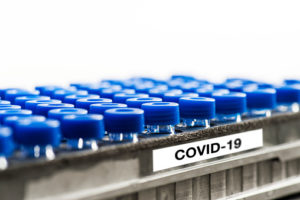With no vetted therapies or vaccines for COVID-19 and almost a million confirmed cases in the United States alone, the demand for convalescent plasma is high. The U.S. FDA is urging recovered COVID-19 patients to donate plasma if they are eligible blood donors and meet the following criteria:
- Confirmed SARS-CoV-2 infection by either a molecular diagnostic test at the time of illness OR a positive serological test after recovery.
- Complete recovery at least 28 days prior to donation OR negative laboratory molecular diagnostic test and complete recovery at least 14 days prior to donation.
In addition, SARS-CoV-2 neutralizing antibody titers should be measured OR a repository sample saved to measure titers later. The FDA recommends a neutralizing antibody titer of at least 1:160, but a titer of 1:80 may be acceptable if another matched unit is not available. Currently, there are insufficient data about how titer levels correlate with viral clearance and even the roles of humoral and cellular immune responses during the infection. Based on 175 hospitalized patients with mild COVID-19 in China, wide variations in neutralizing antibodies have been observed; about 30% of recovered patients either did not generate neutralizing antibodies or had very low responses while about 15% had very high titers. Antibody titers peaked 10-15 days post-disease onset and remained stable at least two weeks after discharge. A second study based on 173 hospitalized patients with mild to life-threatening COVID-19 in China found similar median seroconversion times for total antibodies, IgM and IgG ranging from 11 to 14 days. In addition, higher titers in hospitalized patients at the time of illness were associated with older age and worse clinical outcomes. Additional studies on the seroconversion of patients with COVID-19 are needed along with data from the clinical trials to examine the safety and efficacy SARS-CoV-2 convalescent plasma.
References:
- Zhao J, Yuan Q, Wang H, LiuW, et al. Antibody responses to SARS-CoV-2 in patients of novel coronavirus disease 2019. Clin Infect Dis 2020; doi: 10.1093/cid/ciaa344
- Wu F, Wang A, Liu M, Wang Q, et al. Neutralizing antibody responses to SARS-CoV-2 in a COVID-19 recovered patient cohort and their implications. medRxiv preprint https://doi.org/10.1101/2020.03.30.20047365.
- FDA Investigational New Drug (IND) or Device Exemption (IDE) Process (CBER). Recommendations for investigational COVID-19 convalescent plasma. April 13, 2020. https://www.fda.gov/vaccines-blood-biologics/investigational-new-drug-ind-or-device-exemption-ide-process-cber/recommendations-investigational-covid-19-convalescent-plasma#Collection%20of%20COVID-19 Accessed April 27, 2020.

